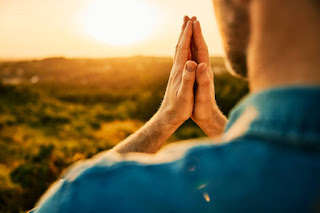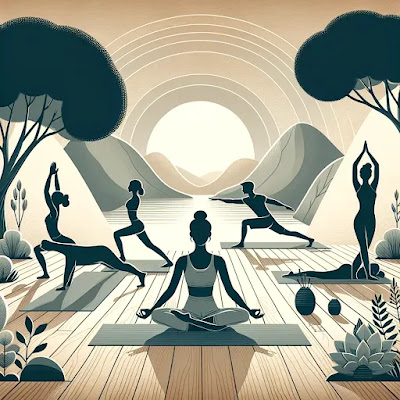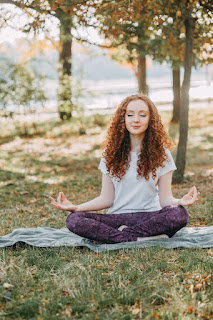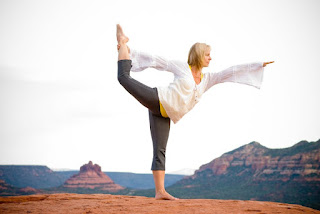Yoga Practice for Physical and Mental Health
Yoga is more than just stretching or exercise—it’s a complete system that nurtures the body, calms the mind, and uplifts the spirit. Rooted in ancient traditions, yoga has evolved into a modern practice recognized worldwide for its healing power. From reducing stress and anxiety to improving flexibility, balance, and strength, the physical and mental health benefits of yoga are profound. In today’s fast-paced world, yoga offers a sanctuary of balance and clarity. This guide will help you explore its practices, philosophy, and how yoga can transform your daily life.
Introduction to Yoga: Exploring Its Physical and Mental Health Benefits
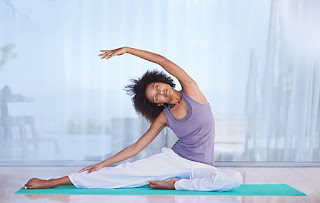
Embracing the World of Yoga
Yoga is more than just a physical practice; it’s a journey of self-realization, mental clarity, and inner peace. Rooted in ancient traditions, yoga has evolved into a practice that unites the mind, body, and spirit. In our modern world, where stress and fast-paced living are prevalent, yoga serves as a timeless sanctuary that helps reconnect us with our essence. But what exactly is yoga, and how can it transform your life? Let’s dive into the different layers of this profound practice.
Yoga for Physical and Mental Health
Yoga isn’t a one-size-fits-all practice. It offers a rich variety of styles, each catering to different needs and preferences. Hatha Yoga, for instance, is known for its slow-paced, foundational poses that improve physical and mental strength. On the other hand, Ashtanga Yoga is a dynamic, physically demanding practice that synchronizes breath with movement. Then, there’s Bhakti Yoga, which focuses on devotion and love, and Karma Yoga, the yoga of action and selfless service.
Modern adaptations like Iyengar Yoga, which emphasizes alignment, and Hot Yoga, practiced in heated rooms, bring unique elements to the traditional practice. Whether you’re drawn to the spirituality of Tantra Yoga or the precision of Iyengar, there’s a style of yoga for everyone. Each practice offers something unique to help individuals achieve mental clarity, physical fitness, and emotional balance.
Asana Practices for Physical Well-being
At its core, yoga is built on foundational poses (asanas) and practices. These form the bedrock for enhancing both physical and mental well-being. Tadasana (Mountain Pose), Adho Mukha Svanasana (Downward Dog), and Savasana(Corpse Pose) are just a few of the essential poses that cultivate strength, balance, and relaxation.
Yoga practice also includes Pranayama (breathing techniques) and Dhyana (meditation), both of which help quiet the mind and regulate emotions. Regular yoga practice can evolve into a deeply personal experience, offering a path to increased flexibility, reduced stress, and better physical and mental health. Over time, these poses and practices can deepen, offering new layers of benefit as one grows into their practice.
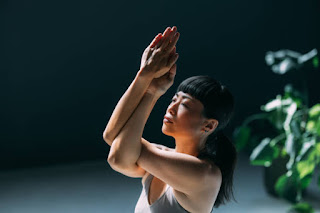
Understanding Yoga Philosophy
The benefits of yoga extend far beyond the physical realm. It has long been recognized for its ability to support mental health, reduce stress, and improve emotional well-being. Through deep breathing techniques, such as Ujjayi Pranayamaand Nadi Shodhana (Alternate Nostril Breathing), practitioners can calm the nervous system, reduce anxiety, and promote a sense of peace.
Incorporating yoga into your daily routine can help with the management of stress, improve focus, and increase body awareness. Studies show that regular practice can alleviate symptoms of depression, chronic pain, and anxiety disorders. For those dealing with chronic low back pain or physical discomfort, the therapeutic effects of yoga can offer significant relief.
Beyond the physical, yoga is steeped in philosophy. The Yoga Sutras, written by Patanjali, outline the eightfold path of yoga, a guide to living a balanced and ethical life. Key elements of yoga philosophy include:
- Yamas and Niyamas: Moral codes and personal observances.
- Pratyahara and Dharana: The withdrawal of the senses and concentration.
By following these principles, yoga practitioners not only transform their physical well-being but also cultivate mental clarity and inner peace.
The Yoga Sutras: Philosophy in Practice
The Yoga Sutras offer timeless wisdom on how to live a meaningful life. Incorporating the principles of karma yoga(selfless action) and bhakti yoga (devotion) can help create harmony between your actions and your spirit
Adaptive Yoga for All Abilities
Yoga is not just a physical exercise but a spiritual and philosophical journey. Rooted in the ancient text, the Yoga Sutrasof Patanjali, yoga offers a blueprint for living a balanced and purposeful life. Central to this philosophy are the Eight Limbs of Yoga, which include ethical principles like Yamas and Niyamas, as well as Dharana (concentration), Pratyahara (sense withdrawal), and Samadhi (union with the self).
Beyond the body, yoga engages the mind and spirit. It is a practice of self-discovery and self-realization, where the individual seeks to align their individual consciousness with the universal consciousness. In doing so, practitioners find not only physical health but also mental clarity and spiritual liberation. This holistic approach is what makes yoga both a deeply personal and universally
One of yoga’s greatest strengths is its adaptability. Yoga can be practiced by anyone, regardless of age, body type, or physical ability. Through practices like Adaptive Yoga and Chair Yoga, individuals with limited mobility can engage in this transformative practice. Chair yoga, in particular, offers modified poses that can be done while seated, making it accessible to people with physical restraints.
Yoga also has a significant role in rehabilitation and healing, whether it’s supporting those with chronic conditions or helping people recover from injuries. With its focus on breath, mindful movement, and relaxation, yoga provides a gentle yet effective way to improve physical symptoms, increase energy, and promote overall well-being.
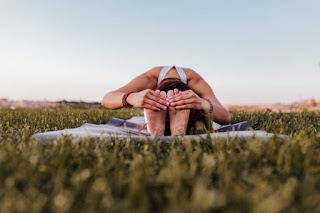
The Power of Yoga in Everyday Life
Yoga, with its blend of physical postures, breathing exercises, and meditative techniques, offers a path to improved health and happiness. Whether you’re seeking physical strength, mental clarity, or spiritual growth, yoga provides tools to cultivate balance and well-being in every area of life. No matter where you are on your yoga journey, remember that yoga is for everyone—accessible, adaptable, and full of possibility.
The Power of Raja and Jnana Yoga in Everyday Life
Raja Yoga is often referred to as the “royal path” and is a practice that focuses on meditation and controlling the mind. Through Raja Yoga, practitioners can develop concentration and willpower, helping to calm the mind in a world filled with distractions. In addition to Raja Yoga, Jnana Yoga—the yoga of wisdom—encourages individuals to seek self-realization through study and contemplation.
Both Raja and Jnana Yoga practices complement each other by offering tools to achieve mental clarity and spiritual growth. These forms of yoga not only improve balance and focus but also promote deep relaxation and a sense of spiritual discipline that can be incorporated into daily life.
Exploring the Modern Evolution of Yoga Practices
In recent years, Modern Yoga has grown in popularity as it blends traditional poses with contemporary approaches. Iyengar Yoga, known for its emphasis on alignment, and Yin Yoga, which focuses on deep stretches and mindfulness, offer unique ways to engage with yoga. Additionally, Power Yoga, a high-energy practice, and Kundalini Yoga, which activates energy through specific techniques, showcase the versatility of Modern Yoga.
These yoga practices not only help practitioners stay physically fit but also encourage spiritual growth by incorporating deep breathing exercises and ancient techniques. Whether it’s through Power Yoga’s intensity or the slow, meditative nature of Yin Yoga, there is a yoga practice for every individual.
Unraveling the Historical Roots: Vedic and Pre-Vedic Period
Yoga’s historical roots stretch back to Ancient India during the Vedic Period, where it was first introduced as a spiritual discipline. These early forms of yoga were integral to the cultural practices of the time, focusing on meditation, breath control, and the spiritual connection between the individual and the cosmos.
Even in the Pre-Vedic Period, yoga concepts such as mindfulness and sense withdrawal were explored through sacred texts and rituals. Understanding the Vedic and Pre-Vedic origins of yoga can deepen one’s connection to the practice, as it highlights the timeless nature of yoga’s teachings and their ability to transcend cultural and historical boundaries.
Yoga for All
Yoga is an inclusive practice that can be adapted to suit individuals of all abilities. Whether through Chair Yoga or other forms of Adaptive Yoga, modified poses allow people with physical limitations to experience the mental and physical benefits of yoga. Practices like Kundalini Yoga and Bhakti Yoga can also be adapted, emphasizing mindfulness and devotion rather than physical strain.
The beauty of Adaptive Yoga is that it brings the profound benefits of yoga, such as deep relaxation and emotional balance, to everyone, regardless of age or ability. By focusing on breath control and meditative techniques, Adaptive Yoga empowers individuals to connect with their bodies and minds, improving both physical health and emotional well-being.
The physical and mental health benefits of yoga reach far beyond the mat. Whether you choose a gentle practice like Yin Yoga, a dynamic flow like Ashtanga, or accessible options like Chair Yoga, each style offers tools for greater well-being. Yoga strengthens the body, sharpens the mind, and opens the heart to a deeper sense of peace and purpose. No matter your age, background, or ability, yoga is a practice for everyone. By embracing its ancient wisdom and modern applications, you can discover a path to health, clarity, and harmony that supports every area of life.
